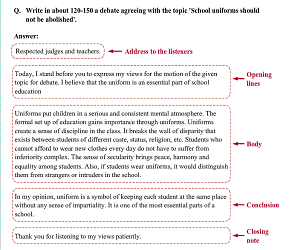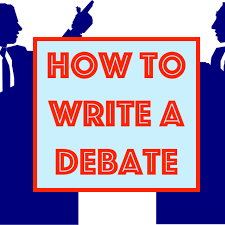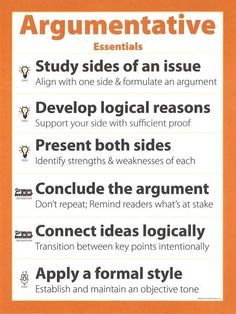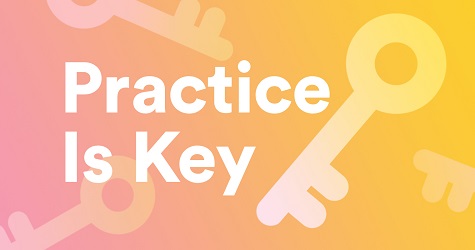DEBATE WRITING for Class 11 ENGLISH
What is Debate Writing?
A formal discussion on a particular matter in a public meeting or legislative assembly, in which opposing arguments are put forward and which usually ends with a vote.
डिबेट यानि वाद-विवाद किसी मुद्दे या संकल्प के बारे में चर्चा है। एक औपचारिक बहस में दो पक्ष शामिल होते हैं: एक संकल्प का समर्थन करता है और दूसरा इसका विरोध करता है। चर्चा के अंत में निर्णय लिया जाता है कि किस पक्ष के तर्क ज्यादा ठोस थे और उन्हें सही घोषित किया जाता है।
FORMAT

1) Formal Address
2) Introduction: Against or for the motion
3) Arguments against or for the motion
4) Conclusion
5) Formal thanks
1) औपचारिक पता
2) प्रस्तावना: प्रस्ताव के विरुद्ध या प्रस्ताव के लिए
3) प्रस्ताव के खिलाफ या उसके लिए तर्क
4) निष्कर्ष
5) औपचारिक धन्यवाद
DO’S AND DONT’S

DO’S
1) Make sure you double-check for grammatical accuracy and spelling.
2) Underlining the main points is very important.
3) Presentation is very important.
1) सुनिश्चित करें कि आपने व्याकरणिक सटीकता और वर्तनी की दोबारा जांच की है।
2) मुख्य बिंदुओं को रेखांकित करना बहुत महत्वपूर्ण है।
3) प्रस्तुतिकरण बहुत महत्वपूर्ण है।
DONT’s
1) Never mention any of your personal details, i.e., name, school name, or, address.
2) Never write in one go. Make sure you follow the right format and make paragraphs.
3) Don’t use slang or short forms.
4) Don’t write wrong facts.
5) Try not to exceed the prescribed word limit of 120 – 150 words.
1) कभी भी अपने किसी भी व्यक्तिगत विवरण, अर्थात नाम, स्कूल का नाम या पता का उल्लेख न करें।
2) कभी भी एक बार में न लिखें। सुनिश्चित करें कि आप सही प्रारूप का पालन करते हैं और पैराग्राफ बनाते हैं।
3) स्लैंग या शॉर्ट फॉर्म का इस्तेमाल न करें।
4) गलत तथ्य न लिखें।
5) कोशिश करें कि 120 - 150 शब्दों की निर्धारित शब्द सीमा से अधिक न हो।
PRACTICE EXERCISE

Q1. You are Mukul / Mahima of Alps Public School. Your school has organized a debate on “Social Media and Its Effects” Â and you will be participating in your school. Prepare your views against or in favor of the motion.
Answer: SOCIAL MEDIA AND IT EFFECTS
FOR THE MOTION:
“We are all now connected by the internet, like neurons in a giant brain”
Honourable judges, teachers, and my worthy opponents thank you for allowing me to join this debate on the topic, “Social Media and Its Effects”. I am Mukul/ Mahima and I would like to speak in favor of the motion.
How many people do not have a smile on their faces after finding an old friend on Facebook? Well, social media has removed all the barriers and boundaries to communication by bringing the globe into a single platform. While business opportunities have widened, marketers’ reach has broadened. It keeps us updated about everything going on in every nook and corner of the world on a real-time basis.
From emergency alerts, announcements, and declarations to knowing how our friends are doing have all become so convenient. It provides freedom of speech and thus, enables everyone to speak their mind. Not to forget the incalculable access it provides to the extensive information.
With so much advancement and innovation, it would be an unimaginable world without social media in it. Someone has rightly put it into words by saying,
“Social media is addictive precisely because it gives us something that the real world lacks: it gives us immediacy, direction, and a value as an individual.”
Thank you.
Q2. “Academic excellence is the only requirement for a successful career.” Write a debate either for or against the motion.
Answer: AGAINST THE MOTION:
Good morning, ladies and gentlemen! My topic for the day is “Academic excellence is the only requirement for a successful career” and I choose to speak against the motion.
“The goal of education is to raise the leaders of tomorrow”. But my question is, How is it that most of the leaders of today happen to be college dropouts? This is because having degrees cannot ensure success. It fails to impart life skills and polish the personality of an individual. They can surely give you an overview of a subject but fail to provide an overview of how the world works. It does not ensure skills and competencies. It tells people what to think instead of how to think and the result is that society now has just robots who have switched their minds off only to believe what is being taught.
One’s attitude towards life is what brings success. Undoubtedly, academic Excellencies can provide you degrees or may even land you a job, but, your success depends upon how you think, behave, walk, talk and present yourself. It has been rightly said,
“Education produces great employees in the market, not employers”.
Thank you.
Q3. “ONLINE SMART CLASSES ARE THE FUTURE OF EDUCATION STYLE”. Write a debate either for or against the motion.
Answer: AGAINST THE MOTION:
Good morning, ladies and gentlemen! My topic for the day is “Online Classes are the Future of Education Style” and I choose to speak against the motion.
Online learning or e-learning refers to learning conducted via electronic media, typically on the Internet. There is no face-to-face interaction between the teacher and the student. It decreases the scope of adjusting and modifying the language or the concept according to various audiences. Moreover, humans are known to be social animals and are thus, more interested in direct tuition than virtual tuition.
There is a lack of proper guidance and self-assessment mechanisms. Not only this, but it would also reduce employment among teachers.
Since it involves only brain work and not physical work, they tend to get lethargic resulting in altered physiology. Also, it leads to a lack of discipline. Attending school makes one have a schedule in a day. This helps them learn some good habits like bathing, breakfast, going to bed at the right time, etc. Physical school helps children adopt discipline.
Not to forget the excellent interactions involved in physical learning. People tend to make friends who support them and mentors who guide them. Thus, no matter how fast technological developments are taking place, the traditional way of learning should not be displaced.
Thank you.
Q4. ‘Homes for the aged is a necessity in India ‘. Write a debate in 120- 150 words either for or against the motion. You are Shivam/ Shivani.
Answer: FOR THE MOTION:
Old age is often referred to as the crown of life, as it is our play’s last act. Honourable judges, teachers, and my worthy opponents, I thank you all for providing me the opportunity to highlight the importance of Old Age Homes in India.
An old age home is a place, a home for old people who have no one to look after them or those whose children have left them on the streets. The place, of course, is like home where the inmates get all the facilities for a routine living, like food, clothing, medicine, and shelter. Old age brings with it physical weakness. In case they are alone at home while you’re away, it would be almost impossible to tackle any medical emergency. These centers will take care of them and cater to all such emergencies
Also, burglars usually attempt to break into a house where a lonely aged person lives, murder them without hesitating, and loot the house. That’s why it is safer to keep your parents in a senior care home when you have to stay away from them for your earnings and are unable to keep them there with you.
Thus, it is crucial to have Old age homes in the country because old age needs so little but needs that little very much. Nothing is more important than a smile that has struggled through tears and many years.
Thank you.
Q5. ‘Brain drain is not a bane for a developing country like India.’ Write a debate in 150 – 200 words either for or against the motion.
Answer: AGAINST THE MOTION:
Respected judges and my worthy opponents, today, I stand before you all to express my views on the topic “Brain drain is not a bane for a developing country like India”. I choose to speak against the motion.
Brain drain is referred to as a situation in which large numbers of educated and skilled professionals leave their own country to live and work in another country where pay and conditions are better. The majority of migration is from developing to developed countries.
This is of growing concern worldwide because of its impact on developing countries. These countries have invested in the education and training of young health professionals. This translates into a loss of considerable resources when these people migrate, with the direct benefit accruing to the recipient states who have not forked out the cost of educating them.
It drains a developing country of expertise at a time when it requires it the most. If the number of skilled people leaving is higher than that of people entering (the so-called brain gain), brain drain can become a challenge, especially if it hits the sensitive spots of a nation’s economy in sectors such as science, health care, or technology.
It is the need of the hour to be in control of the situation. It can be done by providing better opportunity, security, better standard of living and if need be, tax concessions. It’s time to end brain drain and move to brain gain.
Thank you.
Q6. Are celebs responsible for the products they endorse? Write a debate for or against the topic. (About 150-200 words)
Answer: FOR THE MOTION:
Respected judges and my worthy opponents, today, I stand before you all to accentuate why celebrities are responsible for the products they endorse.
Advertising agencies often pick celebrities because their fan following ensures more eyeballs. Celebrities are the present-day gods. They are adored, venerated, and worshipped by many. Given the fan base and the celebrity power of influence, many questions come up. Are they accountable for what the endorser does? Do they at least have the moral responsibility to understand the product better?
It becomes a misleading advertisement if it is found that the product does not have the attributes that the manufacturer professed. And if the brand ambassador has promoted that product and said specifically that the product has those attributes, they are also certainly liable for action.
The brief ban on Maggi noodles implied its celebrity endorsers. Not so long ago, Amitabh Bachchan stepped back from promoting Pepsi after a school girl questioned the health impact of the drink. Celebrities vouch for the performance of a product; they should first use it before endorsing it.
Public figures have an ethical obligation towards those who follow them and this necessitates a framework that guides them to take responsibility for their public image, which includes the products they endorse. Moving in and out of paid contracts might be a solution for the celebrity endorser but it doesn’t erase the impact of their previously branded image.
Thank you.